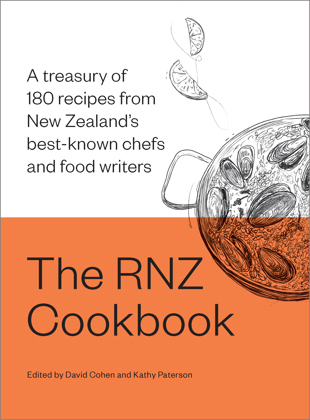David Cohen, editor of The RNZ Cookbook along with Kathy Paterson, was recently interviewed on Stuff:
David Cohen is a Wellington-based journalist and the author of eight books. He is the co-editor of The RNZ Cookbook (Massey University Press), a new collection of 180 recipes from the country’s top restaurateurs and chefs.
Which book do you wish you'd written and why?
The Devil and Sonny Liston, by Nick Tosches, a vivid portrait of a doomed heavyweight fighter, which tells you as much about the author as the subject. I like that approach. I also have a thing for books about boxing.
Which book had such an impact on you that you bought it for your friends?
Philip Roth’s The Counterlife. It’s about a guy who dies and gets brought back to life in Israel and the West Bank. It’s funny, terrifying, extraordinarily ambitious, and nothing in the story ever turns out to be what it seems.
What book do you go back to re-read?
Simone Weil’s Waiting on God is a posthumous collection of the young French philosopher’s limpid thoughts about religion and friendship. She writes in this kind of sexy whisper that I could listen to forever.
Which writer do you turn to when you have writer's block?
I don’t believe in writer’s block. Most writers who call in sick with it are either being lazy or else just having a bad day. I mean, really, do lawyers ever talk about having “lawyer’s block” or electricians say they have “electrician’s block”? It’s a ridiculous conceit. Writing is just hard work. Asked what being a songwriter was about, Leonard Cohen once said it was basically a matter of sitting around in your dressing gown all morning trying to come up with a word to rhyme with “orange”. Yeah, that.
Which authors would you want in your book club?
Nick Cave, John Darnielle and Craig Finn are all basically short-story writers who somehow ended up in the music biz, so I’d invite them. Plus the late Professor Albert Goldman, the author of several controversial biographical studies that would not have seen the light of day in the current puritanical era. Oh, and my darling friend Julie Burchill: every time she writes one of her short aphoristic essays, British journalism gets that much better.
What book did you read as a child or teen that had a profound effect on you?
I loved the teenage wasteland novels of SE Hinton. She was amazing. I also devoured the Billy Bunter yarns and the William series by Richmal Compton, both of which I still enjoy reading.
Have you ever finished a book and gone straight back to the start to read again?
Sense of an Ending, by Julian Barnes. Sort of makes sense, really, because the book is about how we don’t want to forget things. Or at least that’s how I remember the plot.
When it comes to a memorable book, what is more important, a great plot or great characters?
Neither. Powerful dialogue and descriptions can secrete a lot of that anyway. To me, the absolutely critical aspect of writing is voice.
What's your writing routine?
My writing routine consists largely of finding something to write about and then writing about it.
And where do you write?
Well, I always used to enjoy a post-coital cigarette but then smoking went out of fashion. So I started bringing a pen and paper to bed with me. But this created tensions as well. If memory serves, it was around this time that somebody made the crazy suggestion that I look into using a desk.
What “must read” book have you not read? Go on, fess up
I haven’t read many of the celebrated New Zealand fictional works, and the ones I have seen have usually seemed pretty provincial and crammed with way too much stuff about “identity”. What’s the point of doing a book about identity if you’re a 35-year-old creative writing student who still lives at home with your parents?
What books are you planning to dive into over summer?
My wife was recently in Washington and bought me a copy of the American writer Chuck Klosterman’s The Nineties, which has been hailed as a masterful reckoning of the same decade. I’m optimistic. The more I like a book, the longer it takes me to read it, so I’m hoping this one will see me through the entire Christmas period.


